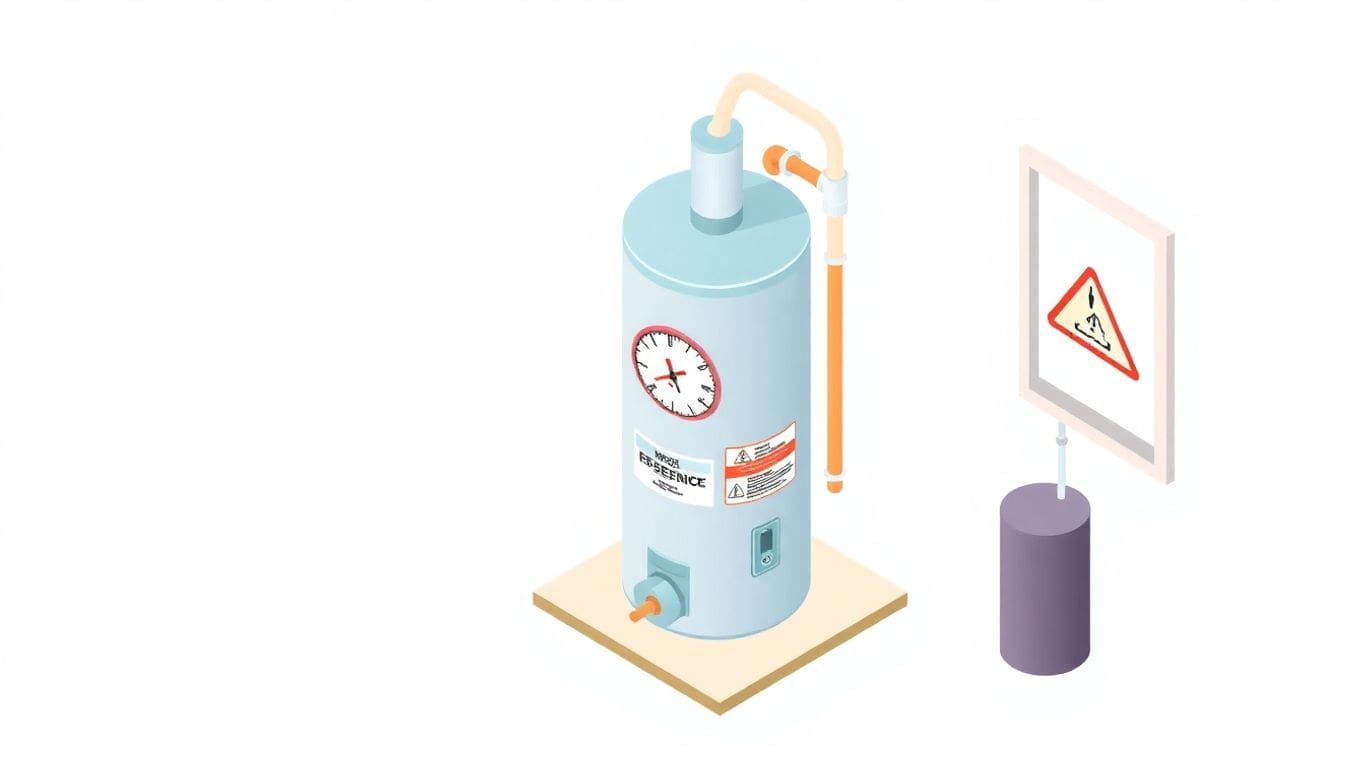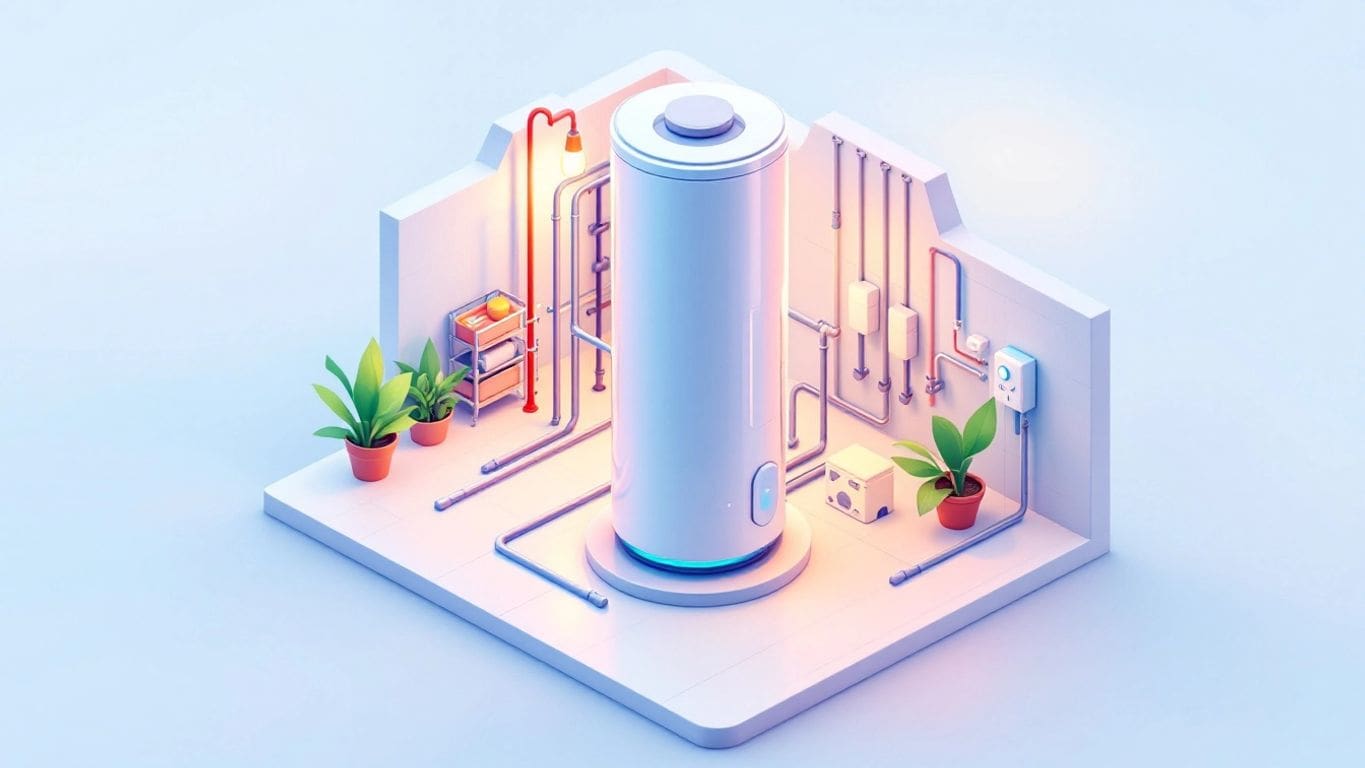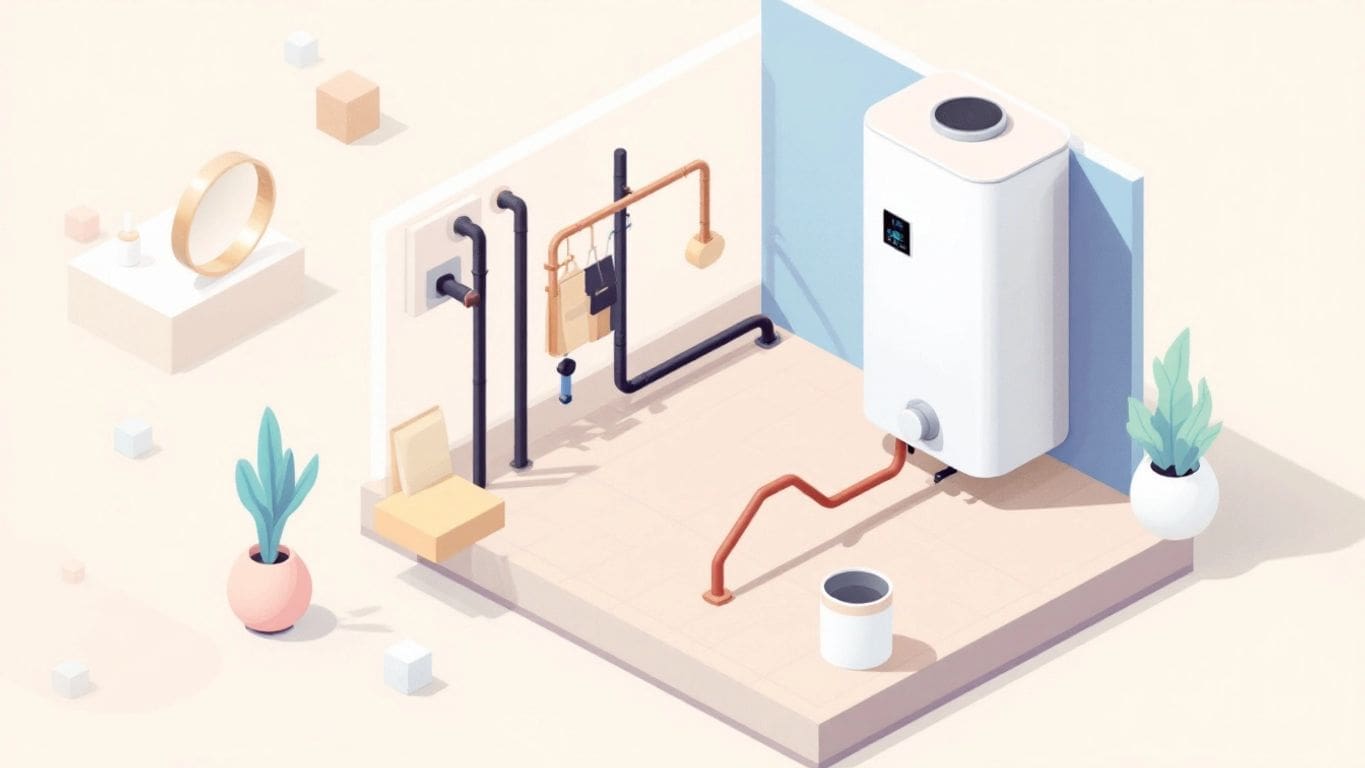
Choosing the right number of water heaters for your home can feel like a daunting task. With so many options out there, and each household having different needs, it’s important to figure out what works best for you. This guide will help you understand how many water heaters you really need, based on your daily hot water usage and specific requirements. Let’s break it down step by step, so you can make an informed decision without the stress.
Before you pick out a water heater, it’s important to figure out what you actually need. Think about how much hot water your family uses and when you use it the most. This will help you choose the right size and type of water heater for your home.
First, you need to know how much hot water you use. A water heater’s capacity is how much hot water it can hold at once. If you get one that’s too small, you might run out of hot water when you need it. If you get one that’s too big, you’ll waste energy heating water you don’t use. Finding the right size is key to saving money and staying comfortable.
Think about all the ways you use hot water each day. Showers, baths, washing dishes, doing laundry – it all adds up. Try to estimate how many gallons of hot water you use for each activity. This will give you a good idea of your total daily hot water usage. For example:
Estimating your daily hot water usage is not an exact science, but it’s a good starting point. You can track your usage for a few days to get a more accurate idea.
Next, think about when you use the most hot water. Is it in the morning when everyone is getting ready for work and school? Or is it in the evening when you’re cooking dinner and doing dishes? Knowing your peak demand times will help you choose a water heater that can keep up with your needs. If everyone showers at the same time, you’ll need a water heater that can quickly heat up more water. Otherwise, someone might end up with a cold shower!
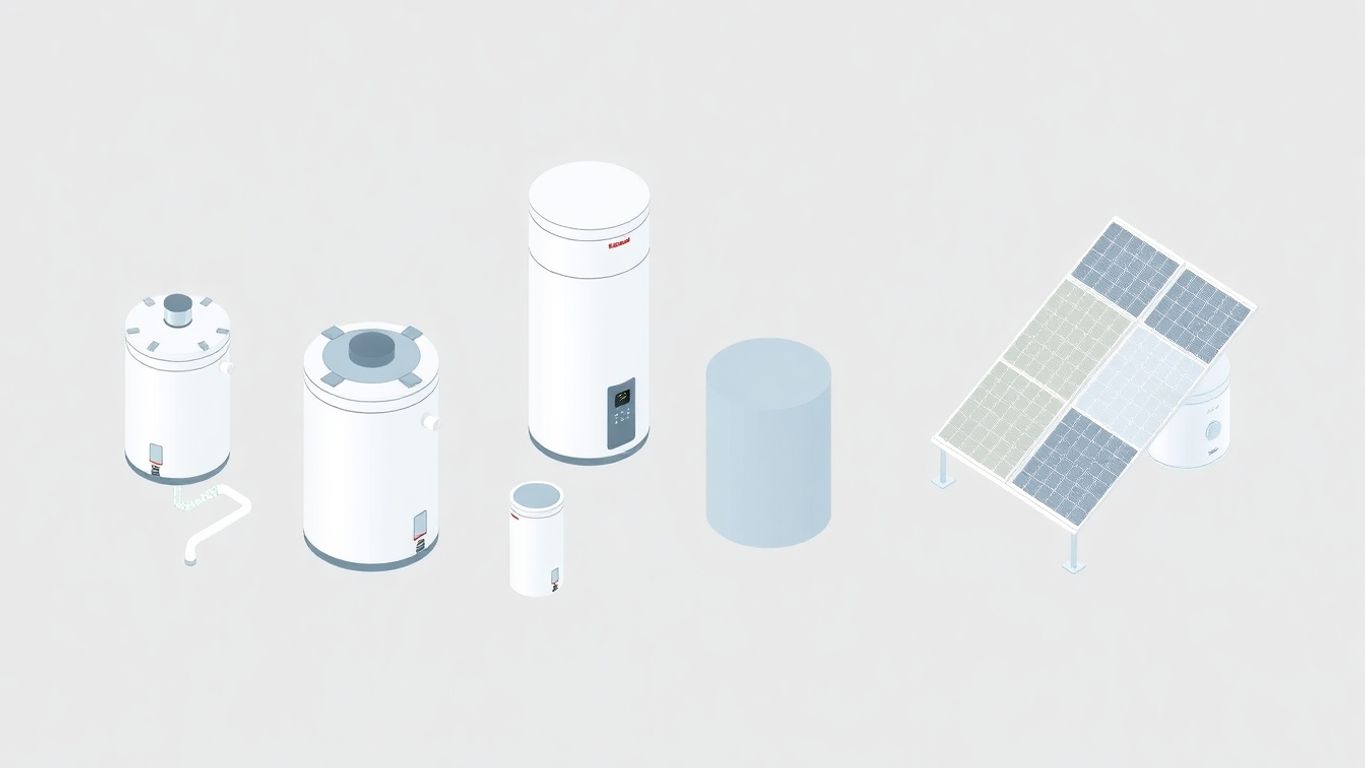
There are different kinds of water heaters you can get for your house. Each type works a little differently and has its own good and bad points. Knowing about them can help you pick the best one for you.
These are the most common type. They have a big tank that holds water and keeps it hot. When you turn on the hot water, it comes from this tank. They’re usually cheaper to buy at first. But, they can waste energy because they have to keep the water hot all the time, even when you’re not using it.
Tankless water heaters don’t have a tank. Instead, they heat water only when you need it. This means you won’t run out of hot water, which is great! But, they can be more expensive to buy and install. Also, some might not be able to heat water fast enough if you’re using a lot of hot water at once.
Tankless water heaters are great if you want to save energy and have hot water on demand. However, they might not be the best choice if you need a lot of hot water at the same time.
Heat pump water heaters are very energy-efficient. They work by moving heat from one place to another, instead of creating heat directly. This can save you money on your energy bill. However, they usually cost more upfront and might need more space to install.
Here’s a simple comparison:
| Feature | Tank Water Heater | Tankless Water Heater | Heat Pump Water Heater |
|---|---|---|---|
| Upfront Cost | Lower | Higher | Higher |
| Energy Efficiency | Lower | Higher | Highest |
| Hot Water Supply | Limited | Unlimited | Limited |
Choosing a water heater can feel like a big deal. There are lots of things to think about! Let’s break it down to make it easier.
How many people live in your house? This is a big one. A bigger family needs more hot water. If you have a lot of people using hot water at the same time, you’ll need a bigger water heater. A smaller household might be fine with a smaller or even a tankless water heater.
Think about how much energy the water heater uses. Look for the Energy Star label. This means it’s good at saving energy. A more efficient water heater might cost more at first, but it will save you money on your energy bill each month. It’s like this: you pay a little more now to save a lot later.
Where will the water heater go? Do you have a lot of space, or are you tight on room? Some water heaters, like the traditional ones with a tank, take up a lot of space. Tankless water heaters are smaller. Also, think about how hard it is to install. You might need a professional to do it right. This can add to the cost, but it’s important for safety.
Picking the right water heater is a balance. You need to think about how much hot water you use, how much it will cost to run, and where you will put it. Don’t rush the decision. Take your time and do your research.
When your old water heater stops working, you might wonder if you should get another electric one or switch to gas. Both have good points, but electric water heaters are becoming more popular because they have some great benefits.
Electric water heaters are good at saving energy. They use over 90% of the energy to heat the water. This means you’ll see lower bills each month. Over time, these savings can really add up. If you’re trying to be eco-friendly, you can even use solar power with your electric heater to save even more!
Electric water heaters usually last a long time, about 10-15 years. They don’t break down as often because they have fewer parts that can wear out. This means less fixing and more hot water for you! They’re also pretty good at resisting mineral buildup, which can cause problems in other types of heaters.
Electric water heaters are better for the environment. They don’t burn fuel to heat the water, so they don’t make carbon monoxide. This makes them a safer choice for your home and the air we breathe.
Electric water heaters are a solid choice if you want to save money, have a heater that lasts, and help the environment. They’re easy to use and safe for your family.
Before you pick out a new water heater, it’s smart to figure out exactly how much hot water you really use. This way, you won’t end up with a water heater that’s too small or too big for your needs. Let’s look at how to figure out your hot water needs.
Think about how you use hot water every day. Do you take long showers? Do you run the dishwasher every night? All these things add up. Knowing your daily habits helps you choose the right size water heater.
Here are some things to consider:
Think about times when you use a lot of hot water at once. For example, maybe someone is showering while the dishwasher is running. These times are called peak demand. You need a water heater that can handle these times without running out of hot water. If you are replacing your old water heater, you might want to consider a larger tank.
Here are some common scenarios:
Your hot water needs might change depending on the time of year. In the winter, you might take longer, hotter showers. In the summer, you might not use as much hot water for laundry. Keep these changes in mind when you’re picking out a water heater.
It’s a good idea to keep track of your hot water usage for a week or two. This will give you a better idea of how much hot water you really need. You can use this information to choose the right size water heater for your home.
It’s smart to think about how much energy your water heater uses. This can save you money and help the environment. Let’s look at how to check energy use.
Every water heater has an energy rating. This rating tells you how well it uses energy. Look for the Energy Factor (EF) on the label. The higher the EF, the more efficient the water heater is. This means it wastes less energy to heat your water. Choosing a water heater with a high EF can lower your energy bills.
Knowing the energy rating helps you guess how much it will cost to run the water heater. You can use the EF and your local energy prices to figure this out. Some websites have tools to help you compare costs. Think about how much hot water you use. This will help you pick the right size and save money. Here’s a simple example:
| Water Heater | Energy Factor (EF) | Estimated Yearly Cost |
|---|---|---|
| Model A | 0.90 | $300 |
| Model B | 0.60 | $500 |
Choosing an energy-efficient water heater can save you money over time. Even if it costs more at first, you’ll save on your energy bills each month. Over many years, these savings can add up. Plus, some areas offer rebates or tax credits for buying energy-efficient appliances. This can make it even cheaper to switch to a better water heater.
Picking a water heater with a good energy rating is a smart move. It helps you save money and be kinder to the planet. Take your time to compare models and think about your needs. This way, you’ll find the best water heater for your home.
Getting a new water heater is a big deal! You want to make sure it’s set up right so it works well and lasts a long time. Here’s what you need to think about when it comes to installing your new water heater.
First, think about space. Water heaters come in different sizes, and you need to make sure the one you pick fits where it’s going. Tank water heaters usually need more room than tankless ones. Measure the area where the water heater will go to avoid problems later. You don’t want to buy a water heater only to find out it won’t fit!
While it might be tempting to install the water heater yourself, it’s usually best to hire a professional. Professionals know what they’re doing and can make sure everything is installed safely and correctly. They can also help you avoid problems that could void your warranty. Plus, they know all the local rules and regulations.
Speaking of rules, every area has its own building codes. These codes are in place to keep you safe. They cover things like how the water heater needs to be installed, what kind of pipes to use, and how to vent the system. A professional installer will know these codes and make sure your water heater installation meets all the requirements. Ignoring these codes can lead to fines or, worse, safety hazards.
Installing a water heater isn’t as simple as plugging it in. It involves plumbing, electrical work, and sometimes even gas lines. Messing with these things can be dangerous if you don’t know what you’re doing. That’s why it’s usually best to leave it to the pros.
Here’s a quick list of things a professional installer will take care of:
Taking care of your water heater can help it last longer and work better. Regular maintenance can save you money and trouble in the long run. Here’s how to keep your water heater in good shape.
Check your water heater regularly for any signs of problems. Look for leaks, rust, or strange noises. If you catch issues early, you can fix them before they become big problems. A quick look every few months can make a big difference.
Sediment can build up in the bottom of your water heater tank over time. This sediment can make your water heater less efficient and shorten its lifespan. Flushing the tank once a year helps remove this sediment. Here’s how:
Flushing the tank is a simple task that can greatly extend the life of your water heater. It helps maintain efficiency and prevents sediment buildup, ensuring consistent hot water supply.
Anode rods are sacrificial metal rods inside the tank that corrode instead of the tank itself. This protects the tank from rusting. Check the anode rod every few years and replace it if it’s mostly corroded. Replacing the anode rod can significantly extend the life of your water heater. It’s a small investment that pays off in the long run.
Here’s a simple table showing how often to check and replace the anode rod:
| Check Anode Rod | Replace Anode Rod (if needed) |
|---|---|
| Every 2-3 years | When heavily corroded |
By following these simple steps, you can keep your water heater running smoothly for years to come.
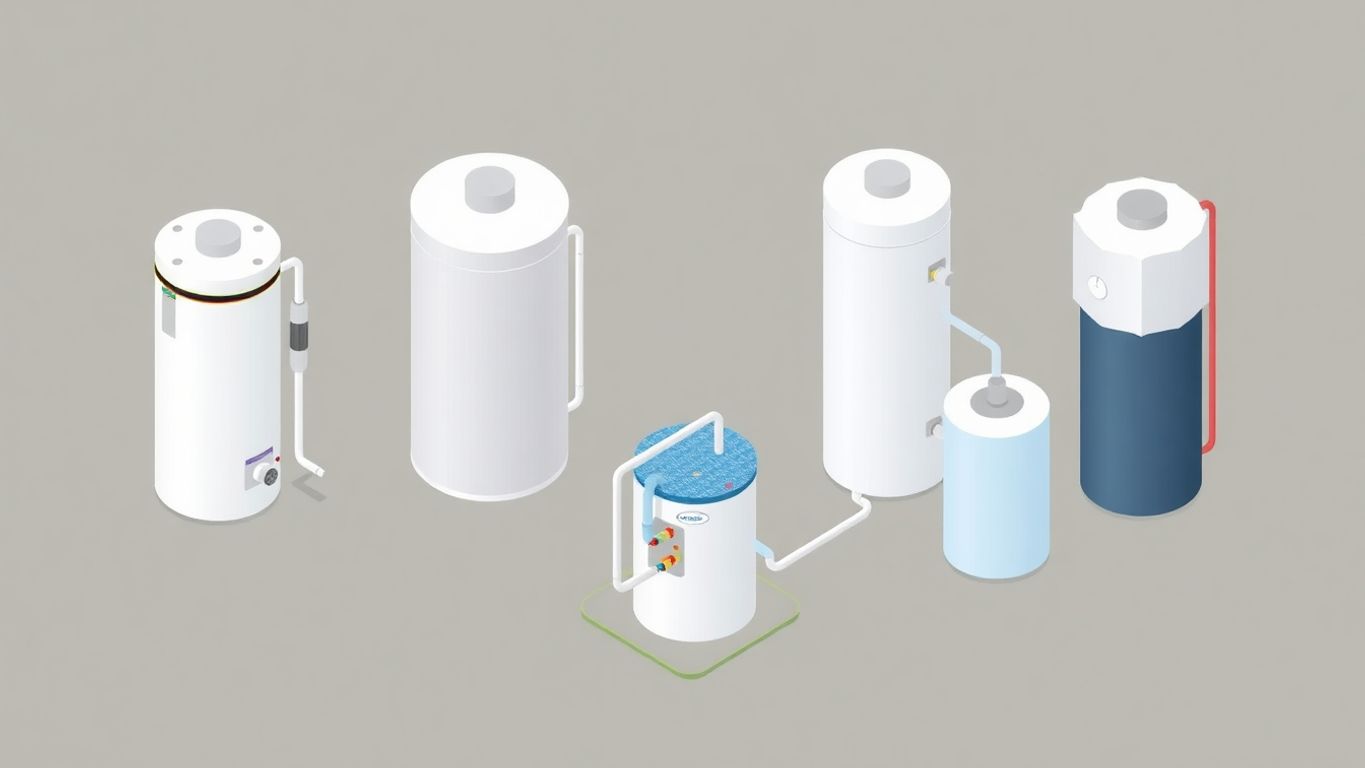
Is your water heater acting up? It’s good to know the warning signs of a problem before it becomes a big headache. One of the first things you might notice is that your water isn’t getting as hot as it used to. Maybe it takes longer to heat up, or it just doesn’t reach the same temperature. This could mean sediment has built up in the tank, making it harder for the heater to work well.
Another sign is strange noises coming from the unit. Gurgling, banging, or popping sounds often mean there’s sediment buildup. Leaks are another big red flag. If you see water around the base of the heater, it could be a sign of a crack or corrosion. Finally, if your water looks rusty or has a weird smell, that could mean the tank is rusting inside.
Okay, so you think there might be something wrong with your water heater. What can you do? First, check the thermostat. Make sure it’s set to the right temperature. Sometimes, it’s just a simple adjustment. Next, look for any obvious leaks around the connections and the tank itself. If you find a leak, try tightening the connections. If that doesn’t work, you might need to call a plumber.
Another thing you can do is flush the tank. This gets rid of sediment that can build up over time. It’s a pretty easy process. Just turn off the power or gas, connect a hose to the drain valve at the bottom of the tank, and let the water run until it’s clear. Also, check the pressure relief valve. Make sure it’s working right. If it’s not, it could cause pressure to build up in the tank, which is dangerous.
Sometimes, you can fix small water heater problems yourself. But other times, it’s best to call in a pro. If you’re not comfortable working with gas or electricity, don’t mess with it. Call a qualified plumber or HVAC technician. Also, if you see any signs of a major problem, like a big leak or a rusty tank, it’s time to get professional help. Trying to fix it yourself could make things worse, and you could end up with a bigger bill in the end.
Knowing when to call a professional can save you time, money, and stress. It’s better to be safe than sorry when it comes to water heater repairs. A pro can diagnose the problem correctly and fix it the right way, so you don’t have to worry about it anymore.
Picking the right size water heater is super important. Too small, and you’ll run out of hot water mid-shower. Too big, and you’re wasting energy and money. Let’s figure out how to get it just right.
First, you need to know how much hot water you use at once. This is measured in gallons per minute (GPM). Think about when you’re using the most hot water. Are you showering while the dishwasher is running and someone’s doing laundry? That’s your peak demand.
To figure out your GPM, add up the flow rates of all the hot water appliances you might use at the same time. Here’s a rough idea of what some common appliances use:
So, if you’re showering (2.5 GPM) while the dishwasher (1.5 GPM) is running, you need at least 4 GPM.
Next, think about the recovery rate. This is how quickly your water heater can heat up more water after you’ve used some. A higher recovery rate means you won’t run out of hot water as quickly.
A water heater with a good recovery rate is like a fast-recharging phone. It gets back to full power quickly, so you’re not left waiting.
The size of your water heater should match your household’s needs. A small apartment with one or two people won’t need as big of a tank as a family of five. Here’s a general guide:
Keep in mind that these are just estimates. If you have teenagers who take long showers, you might need a bigger tank! Also, consider how often you use hot water for things like laundry and dishwashing. If you do a lot of laundry, you might want to go up a size. Think about your daily life and how much hot water you really use.
Buying a water heater is a big deal. You want to make sure you’re covered if something goes wrong. Plus, good customer support can make all the difference if you have questions or problems down the road.
A warranty is like a promise from the company that made your water heater. It says they’ll fix or replace it if it breaks down within a certain time. Make sure you understand what the warranty covers. Some warranties only cover parts, while others cover labor too. Longer warranties usually mean the company is confident in their product.
Imagine your water heater stops working on a cold winter night. Who are you gonna call? Good customer service is super important. Here’s what to look for:
Check online reviews to see what other people say about the company’s customer service. A company with lots of complaints might be one to avoid.
Some brands have been around for a long time and have a good reputation. These brands often have better warranties and customer service. Do some research and see which brands are known for being reliable. Sometimes, paying a little extra for a well-known brand is worth it in the long run. It can save you headaches later on.
Okay, you’ve learned a lot about water heaters. Now it’s time to make a choice. It can feel like a big deal, but let’s break it down to make it easier.
Think about all the different types of water heaters we talked about. Do you want a traditional tank, a tankless model, or maybe a heat pump? Consider the pros and cons of each.
Think about what’s most important to you. Is it saving money on your energy bill? Or is it having hot water right away, even if it costs a bit more?
It’s important to set a budget before you start shopping. This will help you narrow down your choices. Remember to think about more than just the price of the water heater itself. You also need to factor in installation costs and how much it will cost to run the water heater each month. Some things to consider:
Don’t forget to check for rebates or tax credits. Some energy-efficient water heaters qualify for these, which can save you money.
Think about how long you plan to stay in your home. If you’re only going to be there for a few years, you might not want to spend a lot of money on a fancy water heater. But if you plan to stay for a long time, it might be worth it to invest in a more efficient model that will save you money over time. Consider your future needs. Also, think about whether your hot water needs might change in the future. Will you be adding more people to your household? If so, you might need a bigger water heater.
To find the right size, think about how many people live in your home and how much hot water you use daily. A small family might need a 30-gallon tank, while a larger family could require 50 gallons or more.
There are three main types: traditional tank water heaters, tankless water heaters, and heat pump water heaters. Each type has its own benefits and drawbacks.
To boost energy efficiency, look for models with high energy ratings, perform regular maintenance, and consider upgrading to a newer, more efficient model.
Most water heaters last about 10 to 15 years. Regular maintenance can help extend their lifespan.
Check for common issues like power supply or leaks. If you can’t find the problem, it’s best to call a professional for help.
You should inspect your water heater at least once a year. Regular maintenance helps prevent problems and keeps it running efficiently.
Electric water heaters can be more efficient and easier to install, but gas models may heat water faster. It depends on your needs and local energy costs.
Look for a warranty that covers both the tank and parts. A good warranty gives you peace of mind about your investment.

